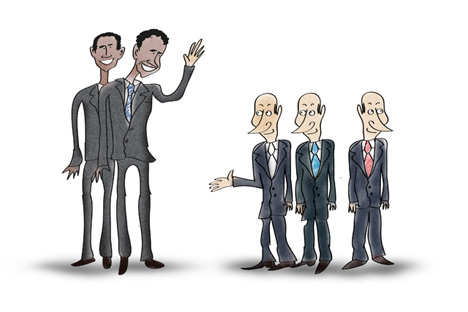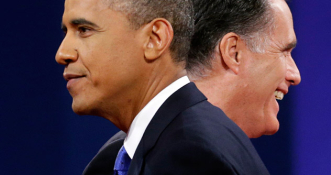Moscow welcomes Obama’s re-election

{***About Obama - without prejudice by Mikhail Rostovsky, RIA Novosti***}

Click to enlarge the image. Drawing by Niyaz Karim
Read Eugene Ivanov's opinion on the next page
About Obama — without prejudice
By Mikhail Rostovsky, RIA Novosti
I do not think that, as president, Romney would have had his sights firmly set on another foreign adventure – maybe yes, maybe no. That is not my starting point. I wish to argue that the difference between Obama and Romney lies in their attitudes toward prejudice.
Obama's foreign policy cannot be described as pro-Russian. If Mitt Romney had won, it would not have signaled a catastrophe for Moscow. Still, on the morning of Obama's triumphant return to office, I still felt a sense of joy and relief.
Modern political life is full of the crazy and the illogical. Yet Obama's victory gives hope: Moscow and Washington will not bicker about outdated and contrived ideological constructs, but about what truly matters in their own national interests.
Russia was once the epicenter of American foreign policy. Today, if Russia is still at the epicenter, it is only at the epicenter of Mitt Romney's speeches.
A few days before the U.S. presidential elections, I met in Moscow with a former high-ranking member of staff under the previous Republican president. The former official’s present business depends on good relations between Russia and America. Regarding the outcome of the forthcoming elections, he displayed remarkable sang-froid, verging on indifference. "What will really change if Romney wins? Today, U.S. foreign policy has very little room for maneuver. Our resources are far from being what they once were. And the common ground shared by the U.S. and Russia – both in a positive and negative sense – is shrinking in size and significance."
Such an assessment is not just an escape clause. China and Iran are now the main concerns of both Democrats and Republicans alike. That distinction once belonged to Russia. Even now, the country is still used as a rhetorical soapbox for people whose youth coincided with the era of the Cold War.
Is it wise to underestimate the importance of rhetoric in politics? No, definitely not. Words and thoughts have substance. Only in their memoirs do politicians take decisions based on necessity and the corridor of opportunity. In reality, the corridor of opportunity often masks deep-seated prejudices.
For example, in making the decision to launch his country into a full-scale war in Vietnam, President Lyndon B. Johnson, according to his biographers, understood that it would destroy the very soul of his presidency. Being behind the "Great Society" slogan, Johnson wanted to go down in U.S. history as a great social reformer. Vietnam forced the president's hand: the war or the "Great Society." Johnson lived and breathed his ideal society. But his mind was beholden to the fashionable foreign policy concept of his day - "the domino theory."
The point of the theory is such: if one domino falls – in this case, if one country in South East Asia turns communist – all the other states in the region will inevitably follow.
But the domino theory proved to be rooted in prejudice. The president lost the war and destroyed his dream of a "Great Society."
I do not think that, as president, Romney would have had his sights firmly set on another foreign adventure – maybe yes, maybe no. That is not my starting point. I wish to argue that the difference between Obama and Romney lies in their attitudes toward prejudice.
Obama is a cool-headed pragmatist, whose gaze is fixed not on the past, but on the future. Romney is a politician whose personal prejudices remain unclear. After all, it is impossible to read a person’s mind –this goes double for politicians. The question of how much a politician believes in his own rhetoric is, I fear, doomed to remain forever open.
The more prejudice there is in Washington, the more there is in Moscow – they feed off each other. Even during Obama's first term, Moscow's attitude toward U.S. policy was bedeviled by wild prejudice.
Seemingly normal people, for example, were convinced that the "Arab Spring" was the result of a cunning U.S. conspiracy.
Those very same people genuinely believe that the opposition sentiment in Russia is the consequence of a devious scheme concocted by the United States, even though, in actual fact, all the political disturbances in Russia come from within.
I am afraid even to imagine how Moscow would have ratcheted up its anti-U.S. prejudice if the electorate had been swayed by Romney's abstruse rhetoric about "geopolitical enemy number one."
To summarize: Obama's second term will not result in America and Russia becoming close buddies. Where our interests do not clearly coincide (or clearly do not coincide) – for example in Central Asia, the Caucasus, the missile defense shield in Europe – the rivalry will be just as intense as ever.
But there is a chance that this rivalry will not be rooted in prejudice. For such familiar sparring partners as Russia and the U.S., that is no small matter.
Mikhail Rostovsky is a political columnist for Moskovsky Komsomolets.
First published in Russian in RIA Novosti.
{***However half-heartedly, Moscow welcomes Obama’s re-election by Eugene Ivanov***}
However half-heartedly, Moscow welcomes Obama’s re-election
By Eugene Ivanov
It’s over. The long and expensive, yet highly entertaining political show called the American presidential election campaign came to an end in the early hours of Nov. 7. By winning 50 percent of the popular vote nationwide and beating his Republican opponent, former governor of Massachusetts Mitt Romney, in eight of nine of the so-called swing states, the incumbent president Barack Obama was re-elected for a second term.
The in-depth analysis of the factors leading to Obama’s victory will keep pundits busy for the months to come. Some will argue that Obama was helped by Hurricane Sandy, which seemed to stop the momentum the Romney campaign acquired coming out of the presidential debates. Others will point to the release, just four days before the election, of the Labor Department’s unemployment report suggesting that the U.S. economy was on track to recovery, an argument the Obama administration has been making for the past couple of years. And there obviously will be those insisting that by being unable to provide substance to his job creation plan—and by failing to emotionally connect with the voters—Romney never had a real chance to win.
Curiously, while the Americans found themselves almost equally split between Obama and Romney, the rest of the world was almost openly cheering for the former. This shouldn’t come as a surprise. No one can doubt that as a mainstream U.S. politician, Obama puts American national interests above all other considerations. Yet, on many occasions he demonstrated a willingness to at least consider national interests of others countries, as long as they didn’t contradict America’s. This provides a clear contrast to Romney, who proudly promised to “never apologize” for U.S. actions and whose declared rules of engagement with other countries, with an exception of Israel, could be summarized by a popular idiom “my way or the highway.” For this reason alone, many foreign leaders would consider Obama as a more trustworthy and reliable interlocutor.
The foreign policy of the new Obama administration is unlikely to change in any profound way; yet, it would be premature to say that there won’t be any changes at all. Obama is a “domestic” president and as many other U.S. presidents with ambitious domestic agenda, he has little passion for global issues. In such circumstances, the U.S. foreign policy is often hijacked by the secretary of state (or sometimes by the National Security Advisor); there is every reason to believe that in the past two years, it’s been Secretary of State Hillary Clinton, not the president himself, who was defining U.S. international priorities.
Clinton is going to step down in January, and until the identity of her replacement becomes known, the precise contours of the U.S. foreign policies will remain somewhat blurry. The leading candidate to succeed Clinton appears to be Sen. John Kerry, an experienced and competent chairman of the Senate Foreign Relations Committee. With Kerry at the helm of the Department of State, one can expect a renewed U.S. involvement in “grand projects,” such as the peace process in the Middle East. At the same time, an emphasis on the global humanitarian issues, championed by Clinton, may subside.
Moscow welcomed Obama’s re-election. And it’s not because he has a lot of fans among the Russian political class. Russia’s policies toward the U.S. are perennially reactive: Moscow never takes the lead in its relations with Washington; rather, it prefers to respond to what Washington throws at it, be it a cold wind of confrontation blown by the Bush administration or a sunny “reset” offered by President Obama. In the eyes of the Russian leadership, Obama is a known quality, and the Kremlin finds it much more convenient to resume the already established relationship rather than spend the time and effort for developing a new one.
Although there seems to be a consensus among the Russian foreign policy establishment that the “reset” is dead, no attempts have been made so far to put forward a proactive, pro-Russian agenda for the Moscow-Washington dialog, at least at the official level. Apparently, the Kremlin is going to take a wait-and-see approach in anticipation of a new paradigm for U.S.-Russia relations emerging from the White House—and then assume the comfortable position of being able to either accept or reject this paradigm. While such an approach may well suit the lifestyle of Russian foreign policy apparatchiks, it’s hard to see how it will advance Russia’s vital national interests.
Eugene Ivanov is a Massachusetts-based political analyst who blogs at The Ivanov Report.
All rights reserved by Rossiyskaya Gazeta.
Subscribe
to our newsletter!
Get the week's best stories straight to your inbox
